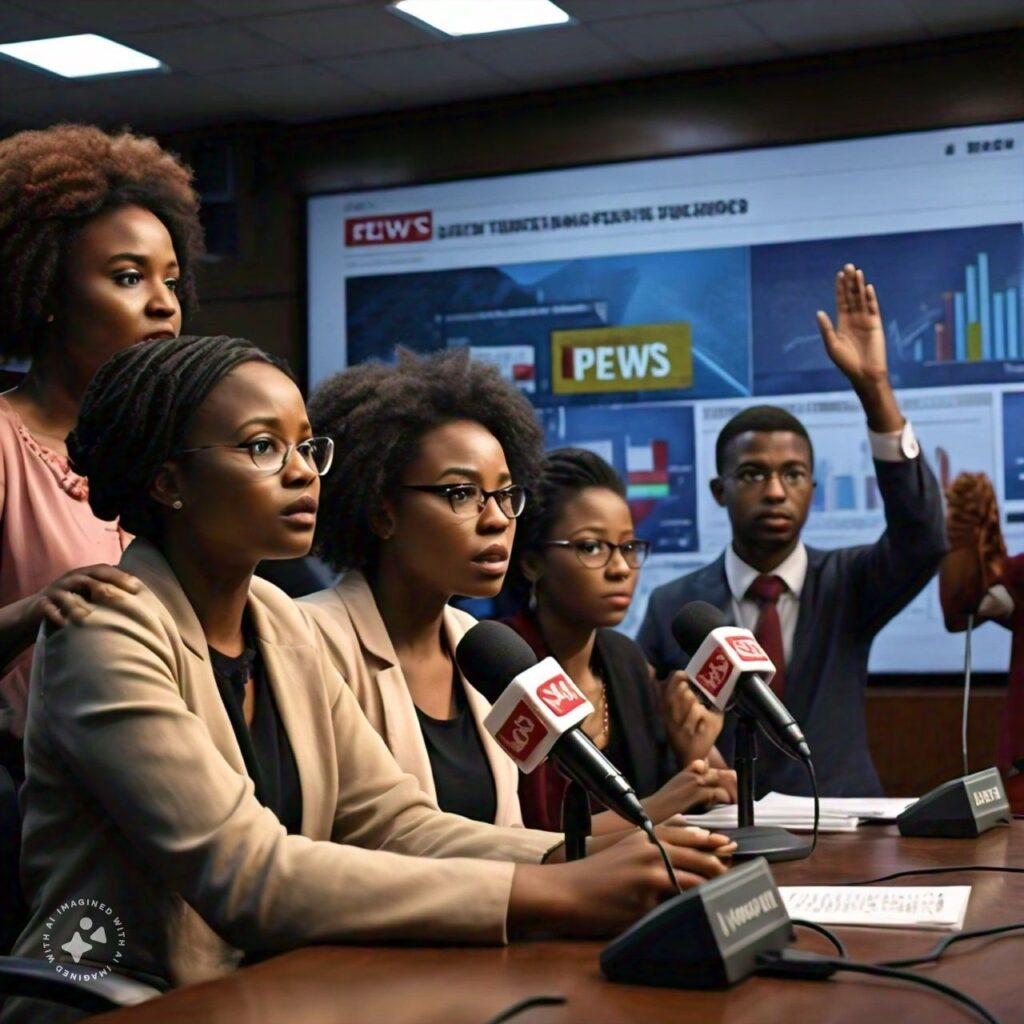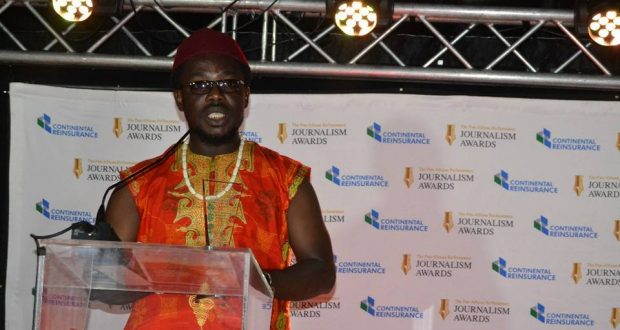Risk assessment and appetite, self-regulation and accountability, active struggle, high standard and fact-based reporting were highlights of thoughts shared by young journalists in separate interviews when asked how they feel about practising journalism in a country with sustained press freedom violations.
The young journalists are resiliently practising the profession despite the harsh realities of declining press freedom in Nigeria, but have their personal guiding and guarding principles.
Like Peace Oladipo, a recent graduate of mass communication now working with PrimeProgress as a development, climate and women issues journalist objected to taking up high-profile investigations like FIJ’s Fisayo Soyombo considering the safety concerns that come with it.
Fisayo Soyombo, a Nigerian investigative journalist and Editor in Chief of the Foundation for Investigative Journalism was recently declared wanted by the Nigeria Police Force for his undercover report about the Nigerian Customs-enabled smuggling in Ogun state.
She said issues like this make true investigative journalism difficult for journalists in Nigeria. Noting that despite having a hard time getting information and uncovering facts during an investigation, journalists still battle with safety concerns when they eventually publish their findings. “It has made journalism very hard to practice because there is no freedom before and after publication,” Oladipo said.
She is also concerned that journalists can easily be traced in Nigeria where bandits and criminals are hard to find, citing the case of the FirstNews Editor, Segun Olatunji who was traced to and abducted from his house and kept from his family for fourteen days by security operatives.
Oladipo noted, as the other young journalists interviewed did, that the implication of this is that young journalists who are afraid of practising journalism before become more afraid. More young journalists would move from true investigative journalism to simpler topics.
Journalists and media professionals in Nigeria keep facing repression, threats, extrajudicial arrest and even attacks in the line of their work despite being constitutionally backed to do it. In the first quarter of 2024, aside from Soyombo and Olatunji, several other pressmen faced varying levels of attacks in different parts of the country. According to a Media Foundation for West Africa (MFWA) monitoring report, Nigeria accounted for 12 out of the 39 violations of press freedom in the region in the last quarter of 2023.
Reporters Without Borders (RSF), the organisation that produces the World Press Freedom Index stated that “Nigeria is one of West Africa’s most dangerous and difficult countries for journalists, who are regularly monitored, attacked and arbitrarily arrested”.
Although with an improved 112/180 score from a 123/180 in 2023, experts have ascribed the paradox of positive numbers to the case of the algorithms aligning in favour of the country since the press freedom climate in Africa has significantly deteriorated.
Jeremiah Omoniyi, another recent graduate of engineering who is now a sports journalist with PremiumTimes and WFM thinks that young journalists should aim at impact first in their works as they try to grow and refine their careers. “Everybody cannot be an investigative journalist,” he said. Interestingly, Omoniyi had been a victim of press attacks even as a campus reporter, when he was assigned to monitor an election in Ekiti state. He was arrested, slapped and detained for several hours by the State Security Service for doing his work.
Omoniyi describes a journalist as a light bearer who illuminates the society and by virtue of their work, agents of darkness who won’t thrive in the face of it will militate against their survival. He noted that this reality, although bad, shouldn’t discourage journalists from doing their legitimate work but make them conscious of the need to be intentional about their work. Media houses should hold themselves accountable to put the journalism profession on a high pedestal because a journalist who is not well-paid can’t report about the government not paying their staff or be immune to corrupt practices that may hinder him from doing a great job.
For young journalists like him, Omoniyi says the realities of declining press freedom in Nigeria should only build them regardless, help them to know what to expect and not run away like cowards in the face of it.
Voicing the same thought as the other young journalists interviewed, Omoniyi noted that no story is worth a journalist’s life. He says the safety of journalists comes first in their endeavours, whenever the risk is more than they can handle they should opt out. He noted not all stories need to be groundbreaking investigations as many groundbreaking reports go without sparking change while some just need to be told to nudge the concerned parties to take action that amounts to impact.
Olokooba Wasiu is a recent law graduate of Usman Danfodiyo University, Sokoto and an investigative journalist with Sahara Reporters, with published investigations on different platforms. Olokooba questions the reality of the existence of guaranteed press freedom in Nigeria. As a law graduate, he referenced Section 39: Right to Freedom of Expression and The Press, in the Constitution which is the basis of press freedom in Nigeria noting that this right which is a natural right, among the fundamental human rights, are limitations not absolute.
The constitution only gives the rights legal backing but the systems that are meant to enable and protect the rights are the ones against the press, not guaranteeing its freedom in reality.
He states that even when journalists, like Soyombo or Olatunji, are doing their work within the ambit of the law there is no guaranteed protection for them.
The problem is not the laws to protect freedom but the enforcement of the laws. “It is not these laws on paper that will protect you, it is court judgements, and who are those that will enforce these judgements? Are they not security operatives?” Olokooba asked.
His fears are not about the existence of laws but of the institutions meant to enforce the laws that are weakening every day
Olokooba says although the fear of repression doesn’t undermine his performance, the question of what if this scenario comes up is always at the back of his mind. He recalled once, after publishing his findings from an investigation into a mining company working with an expired license in Ekiti state, he was constantly tailed and threatened till he told them to go to court with their grievances, and he let them know of how confident he is in his report based on the evidence he had gathered, which shut them up.
To guard against the repressive tactics of bad actors, Olokooba says he always holds his integrity in doing stories high. “For every claim I make, every fact I establish in the course of my work there must always be evidence to back it up” he said.
He also advocates for young investigative journalists to report with facts and evidence only and to never exaggerate findings.
Risk assessment is at the core of his practice as an investigative journalist. Before he sets out to do any investigation, he always weighs the risks involved with his appetite, whenever the parties involved are bigger than the institutions available to protect him he backs out noting his personal conviction that some people are bigger than institutions in Nigeria.
Speaking to the concerns of the young journalists, Ejiro Umukoro, an investigative journalist and ED Training and Development of Lightray Media said that every job has its risks, payoffs and threats and it is important that young journalists understand the terrain that they find themselves in. She said the good and bad of it should not discourage them from doing their job.
She noted that it’s sometimes said that journalists should not sacrifice their lives for a story but medical doctors understand that they have to make tough decisions to save a patient, which may come with personal costs.
Umukoro wants young journalists, when at these crossroads, to know that having proper ethics and the understanding of the rule of law, knowing how things operate and creating a body of network of individuals that will come to their aid is very important.
She also wants media organizations to be pro-journalists and not other parties or involved in politicking, to make their journalists feel more empowered to actively do their work.
“Whatever we do, let us know that we cannot stifle the truth. We cannot bury the truth because the ethics demand that it has to be told and we have to tell it for the public good. You weigh the options, you are practical and intelligent about it, you are smart in delivering it and you must always think of how to protect yourself. The cyber protection mechanisms and other similar things are important to be considered when moving on in the job.” the journalism trainer stressed.


